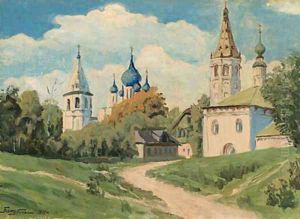Viktor Pavlovich Baturin Paintings
Viktor Pavlovich Baturin is a figure primarily known in the realm of business rather than the traditional field of fine arts or art history. Born in 1947, Baturin's prominence emerges from his entrepreneurial efforts and associations within the Russian business world rather than from contributions to art as a creator or historian. His career is marked by his involvement in various industries, including construction and real estate, which highlights a different aspect of creativity and innovation, albeit not within the conventional boundaries of art.
Despite the initial expectation of an artistic biography, Baturin's narrative is deeply intertwined with the economic and political transformations in post-Soviet Russia, a period that saw a dramatic shift in property relations, the emergence of new business elites, and the creation of significant wealth for a select few. His activities and ventures reflect the complexities and challenges of navigating Russia's evolving economic landscape during this time.
While not an artist in the traditional sense, the story of Viktor Pavlovich Baturin could be of interest from an art historical perspective for the way in which wealth and patronage play crucial roles in the art world. Throughout history, patrons have significantly influenced the production of art, whether through direct commissions, by supporting artists, or through the establishment of galleries and museums that help to shape the cultural landscape. In this context, understanding the life and career of individuals like Baturin can provide insight into the contemporary dynamics of art patronage and its implications for cultural development and artistic direction.
However, it is important to clarify that any direct contributions of Viktor Pavlovich Baturin to the field of art, such as collecting, commissioning, or supporting art and artists, would require a more specific exploration of his personal interests and activities beyond his known business ventures. As of the available information up to 2023, Baturin's legacy is more closely associated with his role in the business world rather than a significant impact on the art historical narrative.






